|
|
|
Sort Order |
|
|
|
Items / Page
|
|
|
|
|
|
|
| Srl | Item |
| 1 |
ID:
180205
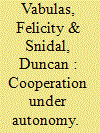

|
|
|
|
|
| Summary/Abstract |
Informal intergovernmental organizations (IIGOs) such as the Proliferation Security Initiative and G20 increasingly play a central role in governing international relations. IIGOs are based on recurrent meetings among high-level state representatives but are not legalized through a treaty and have no permanent secretariat. They allow states to organize internationally without sacrificing autonomy to a supranational entity. We present the IIGO 2.0 dataset, the most comprehensive compilation of these institutions to date, and illustrate the significance of IIGOs through several key empirical findings. First, while the creation of formal IGOs (FIGOs) has plateaued, states are increasingly creating IIGOs to address critical global issues. Second, states disproportionately use IIGOs for high politics issue areas including peace, security, and political agenda-setting which challenges conventional wisdom that IGOs (intergovernmental organizations) are less relevant in the security realm. Third, IIGOs are remarkably durable. Although states could readily formalize or abandon IIGOs, they generally organize cooperation informally for long periods. Finally, IIGOs are typically smaller than FIGOs and this design choice is increasingly used by states of all levels of development, power, and region. The availability of the IIGO 2.0 dataset will promote further analysis on the growing diversity of international institutions.
|
|
|
|
|
|
|
|
|
|
|
|
|
|
|
|
| 2 |
ID:
190064
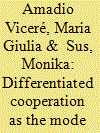

|
|
|
|
|
| Summary/Abstract |
While the standard conceptualization of differentiation in the European Union (EU) focuses on differentiated integration, scholars devote less attention to differentiated cooperation. This article argues, on the contrary, that member states’ engagement in differentiated efforts in EU foreign policy manifest themselves both in the form of differentiated integration and cooperation. It elaborates an original conceptual framework for exploring differentiated cooperation as a mode of governance. Drawing on the articles in this special issue, this introduction maps empirical manifestations of differentiated cooperation in various areas and dimensions of EU foreign policy. The results of the special issue show that differentiated cooperation has mostly manifested itself in informal patterns of cooperation, with the treaty-based mechanisms being limited. As such, the special issue reflects the differentiation and informalization processes occurring not only in the EU, but also in global governance more broadly.
|
|
|
|
|
|
|
|
|
|
|
|
|
|
|
|
| 3 |
ID:
147528
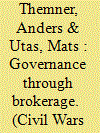

|
|
|
|
|
| Summary/Abstract |
There is currently a lack of knowledge about how elites rule post-civil war societies without strong state institutions. This paper argues that elites oftentimes overcome such institutional deficiencies by engaging in governance through brokerage. According to this perspective, elites outsource central state functions to influential broker figures. This is particularly true when dealing with war-affected groups that possess much violent agency. By functioning as social membranes, brokers can help elites and war-affected groups to redefine a new social contract. Liberia is employed as an example to illustrate the paper’s central arguments.
|
|
|
|
|
|
|
|
|
|
|
|
|
|
|
|
| 4 |
ID:
174569
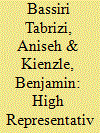

|
|
|
|
|
| Summary/Abstract |
The negotiations with Iran about its nuclear programme have seen the most protracted involvement of the High Representatives of the European Union in a high-profile policy case. This article traces the evolution of the High Representatives’ participation in the negotiations, from the first contacts with the E3 (Germany, France and the United Kingdom) in 2003 to the adoption of the Joint Comprehensive Plan of Action in 2015. It focuses on the institutional role the High Representatives played in relation with the directoires leading the talks with Iran – first the E3 and, since 2006, E3/EU. In this context, it examines the personal and organisational factors that affected the influence each of the three High Representatives (Javier Solana, Catherine Ashton and Federica Mogherini) had in regard to the directoires. The analysis distinguishes specifically between the phases before and after the 2009 Lisbon Treaty. The article shows how similar personal qualities of the three High Representatives in terms of problem-solving and trust-building gave them political capital that enabled them to adopt a fairly constant role as bridge-builders within the directoires and between the directoires and other actors. The reforms of the Lisbon Treaty had only a minor impact.
|
|
|
|
|
|
|
|
|
|
|
|
|
|
|
|
| 5 |
ID:
174712
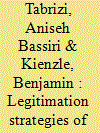

|
|
|
|
|
| Summary/Abstract |
The European Union has seen the rise of informal groups of states as an increasingly important governance mechanism within its formal structures. Such groups can make decision-making processes more efficient, but they also suffer from a substantial lack of legitimacy in the eyes of the non-members. In this article, we examine how informal groups overcome this fundamental dilemma between efficiency and legitimacy and sustain themselves at the forefront of important policy areas. To this end, we trace the development of what we argue to be a particularly useful case: the E3 directoire in the nuclear negotiations with Iran. The empirical results point to new insights into how directoires – and informal groups in general – can use different types of legitimation strategies to gain and maintain legitimacy. More specifically, the E3 implemented three successive legitimation strategies – detachment, co-optation and integration – using different types of legitimacy sources, in particular problem-solving, institutional adjustments and fostering institutional and policy congruence.
|
|
|
|
|
|
|
|
|
|
|
|
|
|
|
|
| 6 |
ID:
151695
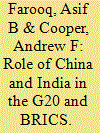

|
|
|
|
|
| Summary/Abstract |
This paper examines China and India’s relationship within the ambit of the G20 process and the autonomous BRICS institutional architecture. The evolving relationship of each of these two emerging powers within these different institutional settings demonstrates a degree of agentic commonality and distinction. China’s and India’s approaches to both the G20 and the BRICS summit processes high-light a combination of status-seeking and hedging behaviour. While China’s cautious approach is complemented by assertive leadership in matters of national interest, India’s leadership has a very specific orientation towards developmental issues. Whereas China’s approach focuses on the United States and the rest of the West, India’s approach is increasingly positioned as a response to China.
|
|
|
|
|
|
|
|
|
|
|
|
|
|
|
|
| 7 |
ID:
165765


|
|
|
|
|
| Summary/Abstract |
This article uses the case of illegal street vending in Harare to explore the interface between urban governance and politics. Drawing on the ideas of urban governance and informal governance, it illustrates how polarisation between the opposition political party Movement for Democratic Change-dominated municipal council and the Zimbabwe African National Union Patriotic Front-led government is affecting governance in general and in particular Harare municipality’s ability to handle the illegal street vending problem. While the paper essentially identifies political expediency as the major reason why a lasting solution is elusive in handling the illegal street vending problem, it acknowledges that there are broad reasons for its persistence. Consequently, the article demonstrates some of the reasons why illegal street vending is difficult to end using the conventional methods and provides some alternatives.
|
|
|
|
|
|
|
|
|
|
|
|
|
|
|
|
| 8 |
ID:
084824
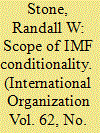

|
|
|
| 9 |
ID:
089960


|
|
|
|
|
| Publication |
2009.
|
| Summary/Abstract |
This paper examines the decisions of the internal corruptors in fixing football games. The methodology is a mixture of interviews, database analysis and examination of a specific series of taped phone calls of a corrupt Russian football official. It finds that generally, this type of match-fixing occurs only after a specific point in the season. There are five implicit questions that corruptors must answer: is the game important enough to fix? Is it morally ethical? Can my team win honestly? Can I afford to fix the game? If I am caught is there a high risk of sanctions? The second section of the paper examines the question of who to bribe? The data indicate that out of the three possible options - referees, players and team officials - the best chance of delivering a successful fix are the team officials. The final section is an examination of the use trust, favour banks and guarantors among the team officials who are willing to sell matches.
|
|
|
|
|
|
|
|
|
|
|
|
|
|
|
|
| 10 |
ID:
113952
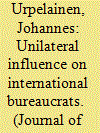

|
|
|
|
|
| Publication |
2012.
|
| Summary/Abstract |
The conventional wisdom emphasizes agency slack or bias as the central problem of international delegation. I show that the possibility of a unilateral influence contest is equally problematic. States can exert unilateral influence on autonomous international bureaucrats, either through rewards or through punishments, to pursue their particular interests. A costly contest results, so some states could refuse to delegate because they expect others to be too influential. The analysis has four counterintuitive empirical implications. First, international agreements often favor institutionally weak states that are disadvantaged in the unilateral influence contest. Second, states could limit the autonomy of an international organization even if this prompts bad policies. Third, a state can sometimes profitably exchange distributional concessions for autonomy. Finally, constraints on unilateral influence are possible only if a disadvantaged state can credibly commit to compensating an advantaged state for it. A central broader contribution of the analysis is to show how power politics influences the rational design of international institutions.
|
|
|
|
|
|
|
|
|
|
|
|
|
|
|
|
| 11 |
ID:
155597


|
|
|
|
|
| Summary/Abstract |
Settlers flocking to boomtowns on the American western frontier were faced with the same task that communities in weak states across the globe face in contemporary times: self-governance. Peer sanctions can enforce cooperation in these environments, but their efficacy depends on the social networks that transmit information from peer to peer. The author uses a game-theoretic model to show that peripheral network positions can generate such strong incentives to misbehave that persistent cheating occurs in equilibrium. The model reveals that groups maintaining high levels of cooperation that face shocks to their strategic environment or to their network can ratchet down into less cooperative equilibria in which the most peripheral become ostracized. Furthermore, population change that features rapid growth, high turnover, and enclave settlements can undermine cooperation. The insights from this article help to explain the trajectory of cooperation in the mining towns of the Wild West in which high levels of cooperation deteriorated as the population surged, and help to make sense of why only certain nonwhite settlers were targets of hostility and racism.
|
|
|
|
|
|
|
|
|
|
|
|
|
|
|
|
|
|
|
|
|